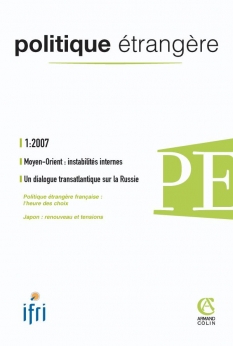
Politique étrangère n° 1/2007
Pour acheter ce numéro, contactez-nous
Recevez les numéros de l'année en cours et accédez à l'intégralité des articles en ligne.
La pratique de la politique étrangère de Mahmoud Ahmadinejad renforce l’emprise du radicalisme sur les équilibres politiques intérieurs. Les attaques répétées contre Israël, la confirmation du programme nucléaire, l’exploitation du chaos irakien visent à développer un consensus populaire susceptible de maintenir la fonction « révolutionnaire » du régime. Plus en Iran que dans d’autres pays, il est difficile de distinguer le champ politique interne de la politique extérieure.
The election in 2005 of an ultra-conservative, Mahmud Ahmadinejad, as President should be seen in the light of three main elements: the loss of credibility of reformers, the general disinterest of the middle class for politics and the widening of the social gap between the rich and the poor. Through his populist discourse, Ahmadinejad has succeeded in reaching out to the most needy. Inspired by the doctrinal sources of Khomeynism, he does not draw any dividing line between internal policy and external goals. He favors a militant Iran, with a revolutionary message and a foreign policy going beyond the pursuit of national interests.